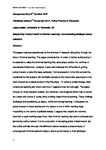Respecting young people’s informal learning: Circumventing strategic policy evasions
| dc.contributor.author | Quinn, Jocey | |
| dc.date.accessioned | 2018-01-16T11:43:59Z | |
| dc.date.available | 2018-01-16T11:43:59Z | |
| dc.date.issued | 2017-11-02 | |
| dc.identifier.issn | 1478-2103 | |
| dc.identifier.issn | 1478-2103 | |
| dc.identifier.uri | http://hdl.handle.net/10026.1/10587 | |
| dc.description.abstract |
<jats:p> This paper explores experiences at the interface of research and policy through the lens of informal learning. The paper contends that in order to further social justice it is essential to value the informal learning that takes place outside the confines of educational institutions. However, it also demonstrates the difficulties in getting policymakers to take this issue seriously. Formal education, in its fixity around the neo-liberal human subject, will inevitably reproduce the values and assumptions that have created an unequal society in the first place. To achieve social change, what constitutes learning and where and how it happens must be rethought. The paper reflects on three research studies – two achieved, one imagined – which help to reveal the extent and nature of young white working-class informal learning. These findings challenge their positioning as abject, deficit and hating learning. It discusses the policy interest in these studies and the current move of white working-class masculinity to the centre of political debate. It argues that despite the nominal attention to such working-class lives, their informal learning was and is deflected and ignored by policymakers. It is not a question of educating policymakers better, but that policy actively chooses this blinkered stance because a shadow body of unrecognised informal learners helps to shore up the status of their privileged qualified peers. The paper concludes that rather than pursuing familiar research pathways, partnership working and micro levels of research combined with alternative forms of communication and agitation may better serve to support young people’s own fight for social justice. </jats:p> | |
| dc.format.extent | 147821031773622-147821031773622 | |
| dc.language | en | |
| dc.language.iso | en | |
| dc.publisher | SAGE Publications | |
| dc.title | Respecting young people’s informal learning: Circumventing strategic policy evasions | |
| dc.type | journal-article | |
| dc.type | Journal Article | |
| plymouth.issue | 2 | |
| plymouth.volume | 16 | |
| plymouth.publication-status | Published | |
| plymouth.journal | Policy Futures in Education | |
| dc.identifier.doi | 10.1177/1478210317736223 | |
| plymouth.organisational-group | /Plymouth | |
| plymouth.organisational-group | /Plymouth/Faculty of Arts, Humanities and Business | |
| plymouth.organisational-group | /Plymouth/Faculty of Arts, Humanities and Business/Plymouth Institute of Education | |
| plymouth.organisational-group | /Plymouth/REF 2021 Researchers by UoA | |
| plymouth.organisational-group | /Plymouth/REF 2021 Researchers by UoA/UoA23 Education | |
| plymouth.organisational-group | /Plymouth/Research Groups | |
| plymouth.organisational-group | /Plymouth/Research Groups/Institute of Health and Community | |
| plymouth.organisational-group | /Plymouth/Research Groups/Plymouth Institute of Health and Care Research (PIHR) | |
| plymouth.organisational-group | /Plymouth/Users by role | |
| plymouth.organisational-group | /Plymouth/Users by role/Academics | |
| dcterms.dateAccepted | 2017-10-02 | |
| dc.identifier.eissn | 1478-2103 | |
| dc.rights.embargoperiod | Not known | |
| rioxxterms.versionofrecord | 10.1177/1478210317736223 | |
| rioxxterms.licenseref.uri | http://www.rioxx.net/licenses/all-rights-reserved | |
| rioxxterms.licenseref.startdate | 2017-11-02 | |
| rioxxterms.type | Journal Article/Review |


